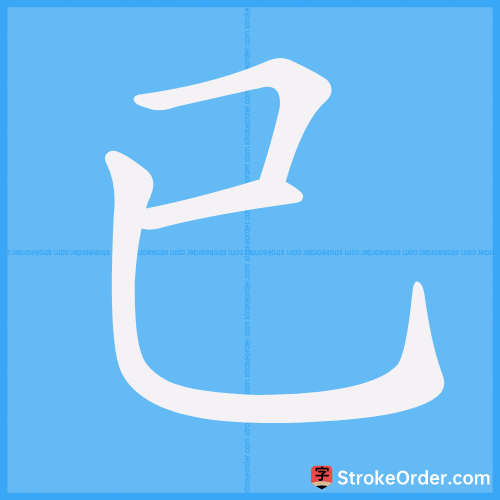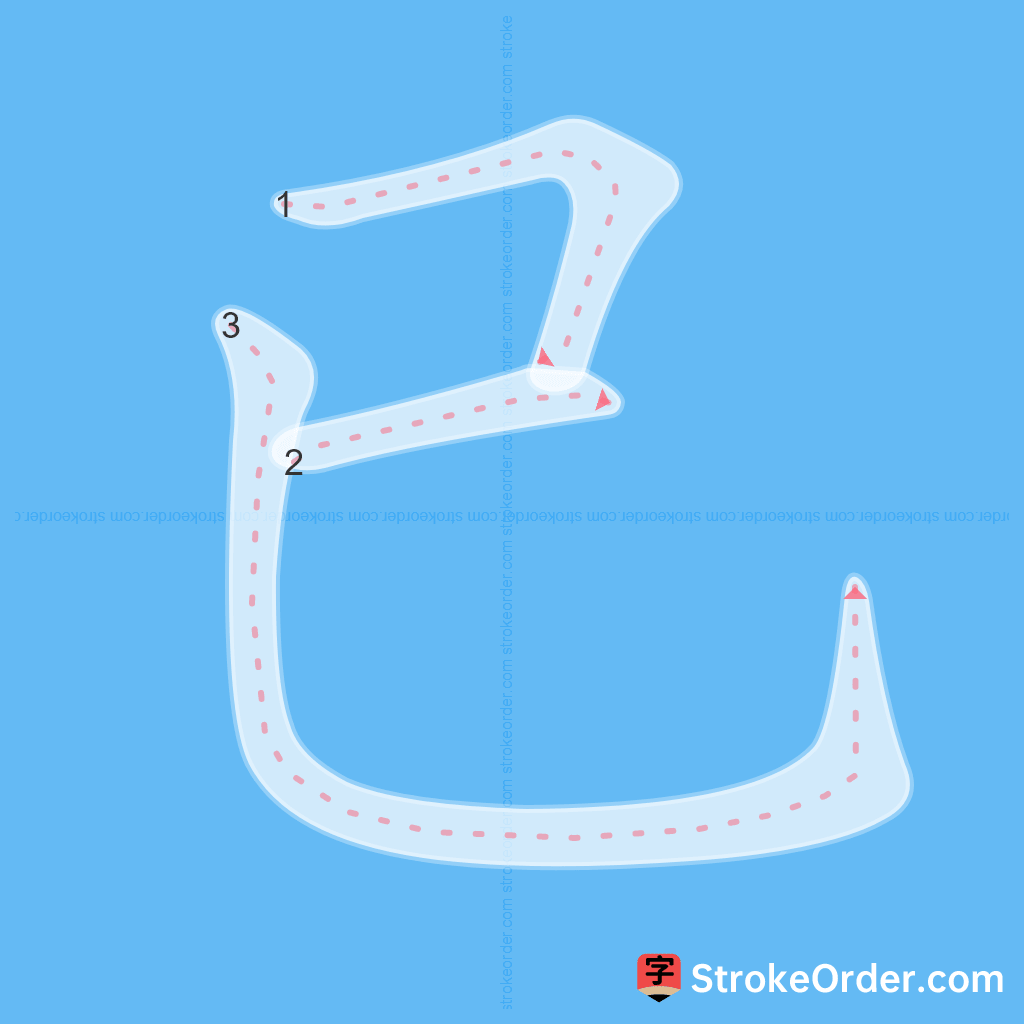已 Stroke Order
Animated Stroke Order of 已

Stroke Order Diagrams for 已

Step-by-Step Handwriting Guide for 已

Learn to Write Chinese Characters with Video Tutorials
Watch the video of writing the Chinese character "已", learn the correct stroke order (笔顺) of the character "已", and master the standard way of writing the character "已".
Free Printable Handwriting Practice with Stroke Order: 已
Printable Writing Practice Worksheet of "已" in Portrait Orientation (Tian Zi Ge)

Printable Writing Practice Worksheet of "已" in Landscape Orientation (Tian Zi Ge)

Information of 已
Pinyin
yǐ
Radical
己
Strokes
3 strokes
Usage
★★★★★
Definition
already / to stop / then / afterwards
已 [yǐ]
1. 止,罢了。
Cease; stop.
2. 表示过去。
Indicates the past.
3. 后来,过了一些时间,不多时。
Later on; after some time, not long after.
4. 太,过。
Too; excessively.
5. 同“ 以 ”。
Same as "以".
已 [yǐ] (verb)
【本义】: 停止
Root meaning: Stop.
【造字法】: 象形。象蛇形。一说原与“子”同字。
Character formation: Pictographic; resembles a snake shape. One theory suggests it originally had the same character as "子".
1. 同本义 ([En.] cease; stop)
Same as the original meaning (cease; stop).
引用:
1. 《诗·郑风·风雨》:鸡鸣不已。 传:“已,止也。”
"The rooster crowed without ceasing." (Translation: "已 means to stop.")
2. 《诗·小雅·南山有台》:德音不已。 传:“已,止也。”
"The noble sounds ceased not."
3. 《史记·项羽本纪》:以故事得已。
"By historical stories, this has ceased."
4. 《列子·汤问》:操蛇之神闻之,惧其不已也,告之于帝。
"The god of snake handlers heard this and feared it would not cease, thus reported it to the Emperor."
5. 《孟子·告子上》:是亦不可以已乎?
"Can this not also cease?"
6. 《后汉书·列女传》:累寸不已,遂成丈匹。
"Progressing inch by inch without ceasing, it eventually became a yard."
7. 清· 袁枚《黄生借书说》:非夫人之物而强假焉,必虑人逼取,而惴惴焉,摩玩之不已。
"If one forcefully borrows items that do not belong to them, one must worry about being pressured to return them, being anxious and continually touching them."
例:
又如: 不已 (not ceasing).
2. 完成,完毕 ([En.] finish)
Complete; finished.
引用:
1. 《广雅》:已,成也。
"已 means to accomplish."
2. 《易·损》:已事遄往。 注:“竟也。”
"The finished matter quickly moves on." (Note: "已" means to finish.)
3. 《左传·昭公十三年》:且曰吾已。 注:’犹决竟也。”
"And said 'I have finished'." (Note: it implies conclusiveness.)
4. 《国语·齐语》:有司已于事而竣。 注:“毕也。”
"The officials have completed the matters." (Note: it means to finish.)
例:
又如: 已矣 (finished; passed away).
3. 治愈 ([En.] cure)
Cure; heal.
引用:
1. 唐· 柳宗元《捕蛇者说》:已大风、挛踠、瘘疠治愈大风、挛踠、瘘、疠(等重病)。大风,麻风病。挛踠,手脚弯曲不能伸展。瘘,脖子肿。疠,恶疮。
"Cured of major ailments such as leprosy, deformities, swelling in the throat, and ulcers."
已 [yǐ] (adverb)
1. 已经 ([En.] already)——表示动作变化达到的程度
Already; indicating the extent to which an action has occurred.
引用:
1. 明· 归有光《项脊轩志》:北向不能得日,日过午已昏。
"Facing north couldn't catch sunlight, by afternoon it had already darkened."
例:
如: 已装不卸 (metaphorically means established, cannot change).
2. 以前 ([En.] before).
Before; previously.
例:
如: 已先 (formerly; previously); 已事 (past events).
3. 罢了,算了 ([En.] well).
Well; that's enough.
例:
如: 已乎 (that's enough).
4. 太 ([En.] too)——表示程度
Too; indicating degree.
引用:
1. 《诗·唐风》:无已大康,职思其居。
"There is too much of great prosperity, thinking of its residence."
2. 明· 张溥《五人墓碑记》:死而湮没不足道者,亦已众矣。
"Those who have died and disappeared and are not worth mentioning are indeed numerous."
5. 又 ([En.] also)——表示行为的频率
Also; indicating frequency of actions.
引用:
1. 《世说新语》:周子居常云:“吾时月不见 黄叔度,则鄙吝之心已复生矣。”
"Zhou Zi often said: 'If I don't see Huang Shudu for a month, my petty thoughts will arise again.'"
6. 最终,终归 ([En.] finally)
Finally; ultimately.
引用:
1. 《荀子》:其所以贯理焉,虽亿万已不足以浃万物之变。
"The method of relating, even billions is not sufficient to cover the transformations of all things."
7. 已而,然后 ([En.] then; after that)
Then; after that.
引用:
1. 明· 归有光《项脊轩志》:庭中始为篱,已为墙。
"Initially in the courtyard it was a fence, then it became a wall."
to act against one's will / to have no alternative but to / to have to / to have no choice / must
lit. the timber has been turned into a boat already (idiom) / fig. what is done cannot be undone
Input Method for 已
Pinyin
yi3
Wubi
nnnn
Cangjie
su
Zhengma
yya
Four Corner
17717
Unicode
U+5df2
Same Pronunciation Characters